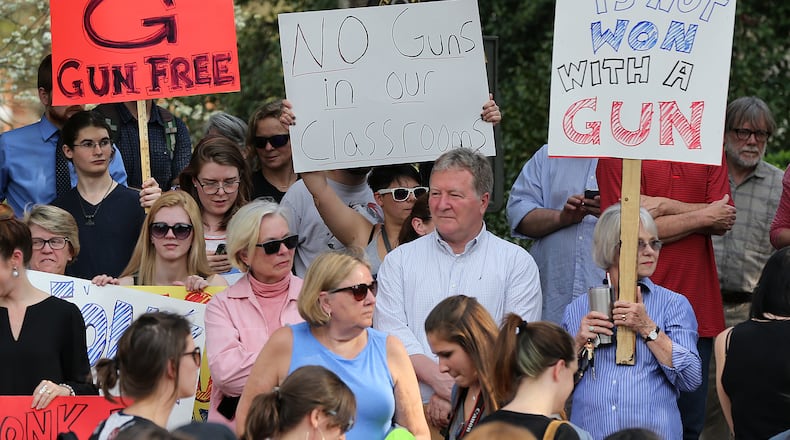A group of Georgia professors will await a state appeals court’s decision to determine whether they can challenge a state law that allows licensed gun owners to carry weapons on some parts of public college campuses.
Lawyers for the professors told members of the Georgia Court of Appeals on Tuesday that the campus gun law is unconstitutional because it infringes on the state Board of Regents’ ability to set its own policies.
A decision on whether the case will proceed in the court system is expected by November.
Six professors at schools in the University System of Georgia are suing former Gov. Nathan Deal, Gov. Brian Kemp and Attorney General Chris Carr, saying the 2017 law violates the separation of powers provision established in the state’s constitution.
“So long as there’s any conceivable possibility that plaintiffs can show what they claim, the case has to go forward,” attorney Brian Lea argued.
Representing Deal and Carr, Assistant Attorney General Josiah Heidt argued that the lawsuit can’t be brought because of “sovereign immunity,” a legal doctrine rooted in the centuries-old English principle that “the king can do no wrong.” Plaintiffs often try to get around the law by suing an officeholder as an individual and not in their official capacity.
“This is a case in which the professors are essentially complaining about their changed work environment,” Heidt said. “And to complain about that environment, they’ve sued two government officials who don’t have anything to do with their employment. They don’t have anything to do with enforcing the laws that they’re complaining about.”
A Fulton County Superior Court judge sided with Heidt when she dismissed the case last year, saying Georgia law prohibits state government from being sued. Superior Court Judge Kimberly Esmond Adams wrote at the time that the ruling had nothing to do with the merits of the complaint.
The professors say the campus gun law is dangerous. It was long sought by conservatives and gun rights activists as a safety measure for students, faculty and administrators. Deal signed the law in 2017.
Appeals Court Judge Stephen S. Goss asked how it could be proved that Deal and Carr acted as individuals and not under the duties of their office.
While Heidt argued that there is no evidence to prove they acted as individuals, Lea said those findings would be brought if the case was allowed to continue through the court system.
Presiding Appeals Court Judge Christopher J. McFadden told attorneys representing Deal and Carr that it appeared the campus gun law conflicts with the Georgia Constitution.
“It seems to me that they’re clearly right,” McFadden said. “They’ve got a provision that says universities may not regulate carrying guns on their campuses, and then another provision of the constitution that gives the Board of Regents authority to regulate what goes on on campus.
“There’s a valid question, which is above our pay grade, about whether or not those two things can mix,” he said.
Heidt said he didn’t believe the state’s constitution establishes separation of powers between the Legislature and the Board of Regents.
McFadden said the question becomes who is the correct person to sue.
“We have to assume the purpose here is that there is something worth fighting for,” he said.
Stay on top of what’s happening in Georgia government and politics at www.ajc.com/politics.
About the Author
Keep Reading
The Latest
Featured




